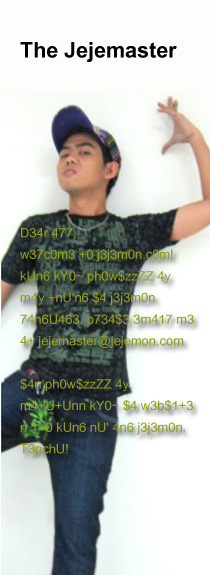Introduction

Jejemon, a subculture that emerged in the Philippines around 2010, represents a fascinating intersection of language, technology, and identity. Defined by its unique style of communication, Jejemon culture has sparked debates, intrigued linguists, and provided insight into the dynamics of online communities. In this exploration, we delve into the origins, characteristics, and impact of Jejemon, shedding light on its significance in contemporary society.
Origins

The term "Jejemon" is a portmanteau of "jeje" and "pokemon," reflecting the influence of online gaming and chat culture. It first gained prominence on social media platforms and online forums, where individuals began adopting a distinct linguistic style characterized by unconventional spelling, excessive letters, and a blend of English, Filipino, and internet slang. While the exact origins of Jejemon remain unclear, it is believed to have emerged around 2009, fueled by the proliferation of mobile phones and internet access among Filipino youth.
Characteristics
At the heart of Jejemon culture lies its unique linguistic code, which often involves substituting letters with numbers or symbols and inserting unnecessary characters for emphasis. For example, the phrase "I love you" might be written as "Eye L0v3 y0w." This stylized form of communication is not only a means of self-expression but also a way to establish belonging within the Jejemon community. Beyond language, Jejemon culture encompasses fashion, music, and social behavior, with adherents often identifying through shared interests and aesthetics.
Impact

The rise of Jejemon culture has sparked diverse reactions, ranging from fascination to disdain. Critics argue that Jejemon represents a degradation of language and communication, undermining linguistic norms and standards. Others view it as a creative expression of identity and a reflection of the evolving nature of language in the digital age. From a sociolinguistic perspective, Jejemon offers insights into the fluidity of language and the ways in which communities negotiate meaning and belonging in online spaces. Additionally, it highlights the role of technology in shaping cultural practices and identities.
Vice Ganda and KC Concepcion featuring Jejemon.com
Catch Vice Ganda's appearance on KC Concepcion's TV program showcasing the Jejemon.com website. It was also worth mentioning that Justin Bieber even tried to be a jejemon as per confirmation of KC. Check out the video link below:
Conclusion
Jejemon culture exemplifies the dynamic interplay between language, technology, and society in the contemporary era. While its unconventional linguistic style may challenge traditional notions of communication, it also serves as a testament to the creativity and adaptability of human expression.

By understanding Jejemon culture, we gain valuable insights into the diverse ways in which individuals navigate and negotiate their identities in an increasingly interconnected world. As language continues to evolve in response to technological advancements, phenomena like Jejemon remind us of the complex and multifaceted nature of communication in the digital age.